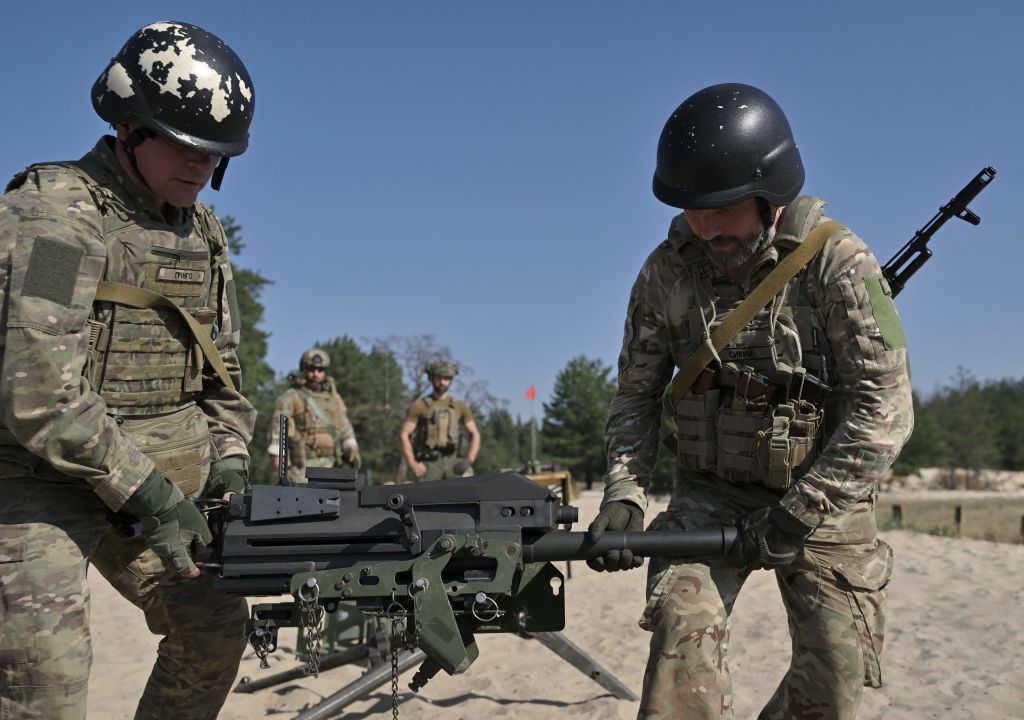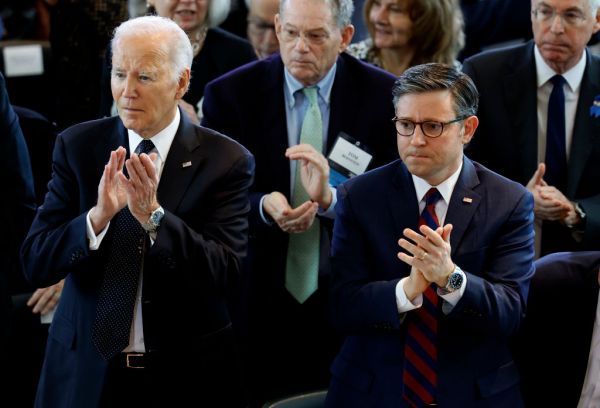The Senate has passed a $95 billion supplemental national security spending bill, with the majority of funds intended to provide military support for Israel, Ukraine, and Taiwan and humanitarian aid for civilians affected by those conflicts. While those opposed to backing Ukraine—such as Sen. Rand Paul—-argue that such aid puts “Ukraine first and America last,” most of the package invests in backfilling U.S. weapons stocks and rebuilding parts of America’s defense industrial base.
Far from being a “blank check” to foreign countries, $73 billion, or 77 percent, of the supplemental funding is domestically invested, with $59 billion going directly to U.S. defense companies—and their workers. The $24 billion in funding that does leave the United States largely consists of humanitarian aid and the cost of various operations shouldered by the U.S military. The Department of Defense receives the lion share of funding at $67 billion (70 percent), but other federal agencies—including the Departments of Energy, Homeland Security, State, and Health and Human Services—receive billions for national security initiatives.
Funding to support Ukraine’s military accounts for 49 percent of the bill, at $48 billion. The Ukraine assistance focuses mostly on transferring equipment, with a large majority dedicated to sending the Ukranians U.S. equipment and then backfilling existing shortages in U.S. stocks. This has been true for most of the $67 billion in military aid supplied to Ukraine in earlier supplemental packages, which have primarily consisted of tranches of existing U.S. stocks.
Specifically, previous aid to Ukraine has largely gone toward obligations and contracts under the Ukraine Security Assistance Initiative (USAI) and Presidential Drawdown Authority—which fund the transfer of equipment from U.S. stocks to Ukraine and their subsequent replacement. Funds spent through the USAI do not go directly to Ukraine, but rather function as a pool of funding that Ukraine can spend in the United States on American military hardware.
Materiel aid to Ukraine has consisted of millions of munitions, more than 2 million 155mm artillery shells, thousands of anti-air and anti-tank systems, and hundreds of armored vehicles. Without fresh funds to boost replacement orders, these systems will not be adequately replenished as “peacetime” Pentagon budgets simply don’t cover such rapid expenditure rates of essential weapons. For example, the United States has supplied Ukraine with more than 10,000 anti-tank Javelin missile systems. But this year’s White House defense budget request seeks to buy just 541 new ones. At that business-as-usual rate of replacement, the Pentagon would need about 20 years to get the Javelin stockpile back to pre-war levels.
Similarly, the annual budget for the Army requests just $150 million for artillery shells, but the national security supplemental includes $5.9 billion for investments for 155mm artillery production. This would provide a needed boost to a sector that has been in decline and help the Army reach its long-stated goal of producing 100,000 rounds per month.
Additionally, supplementary funding allows the United States military to replace the older and less sophisticated equipment that has been sent to Ukraine with modern equivalents, essentially jumpstarting modernization plans. Humvees and Bradleys near the end of their lifecycle are given new leases on life in Ukraine, and the Pentagon can invest in new replacements.
Beyond Ukraine, the bill spends billions for Israel, Gaza and the West Bank, Taiwan, East Africa and other U.S. partners. There is $10.6 billion in direct military aid to Israel, with $4.4 billion of that funding spent in the United States to replenish stocks already transferred to Israel. Similarly, an additional $2.1 billion goes towards replenishing equipment transferred to Taiwan, including key anti-ship munitions crucial to US military deterrence in the Indo-Pacific region.
Aside from backfilling aid to allies, the supplemental also includes key investments solely for U.S. capability, including $2.4 billion to pay for recent U.S. military operations against the Houthis in the Red Sea. The Navy’s use of precision munitions is not adequately offset by the Pentagon’s planned annual purchases and requires extra funds over and above the regular military spending bill. Additional provisions, such as $133 million to enhance industrial capacity for cruise missile components, target specific domestic supply chain bottlenecks to ensure industry will be able to meet sustained demand.
The U.S. even benefits from some of the money that is spent overseas. The national security supplemental provides $542 million to address the U.S. Indo-Pacific Command’s unfunded priorities. These “wish list” items include joint training with regional allies and investments in Guam’s defenses—an island with U.S. troops and facilities that are some of the “most strategically important U.S. bases in the Pacific” and which “constitute the island’s most important source of income and economic stability.”
The legislation also provides $3.3 billion for American companies building submarines, an industry which has atrophied in recent decades. The goal is to reverse the shortfall in submarine availability and ensure that the United States both has an adequate supply of subs to meet both our own plans and support commitments to Australia and the United Kingdom.
Outside of the Department of Defense, other agencies and legislative measures close out the proposed supplemental funding. The Department of State and the U.S. Agency for International Development (USAID) receive the second largest amount of resources, at a combined $25 billion. These efforts include $7.8 billion in direct budgetary assistance to Ukraine, and $7.1 billion for foreign military financing for military equipment for Israel, Indo-Pacific partners, and Ukraine. Unlike the aforementioned efforts to replenish U.S. stockpiles, this funding allows for U.S. allies to procure new American military hardware directly..
Lastly, the national security supplemental includes leftover legislation from the previously cut border deal provisions, specifically the “Fend Off Fentanyl Act.” These provisions declare fentanyl trafficking a national emergency, enhance sanctions on drug traffickers, and provide the Department of Treasury with new authorities to prevent money laundering through drug trafficking.
Branding the national security supplemental bill as one of “foreign aid” belies the reality that the funds primarily benefit the kickstarting of an American defense and aerospace manufacturing turnaround that our armed forces need to deter enemies and win if at war. America gave away her “arsenal of democracy” in the misguided belief the end of history happened in 1991 and companies took their cue and downsized, merged, or exited altogether. Now supporting two wars, Washington has discovered that the defense cranks cannot just turn back on again easily. Facilities need to be repurposed, workers need to be upskilled, supplies need to be reshored, and stockpiles need to be replenished and bigger than before. The United States is the ultimate beneficiary of the supplemental spending bill, as it should be.








Please note that we at The Dispatch hold ourselves, our work, and our commenters to a higher standard than other places on the internet. We welcome comments that foster genuine debate or discussion—including comments critical of us or our work—but responses that include ad hominem attacks on fellow Dispatch members or are intended to stoke fear and anger may be moderated.
You are currently using a limited time guest pass and do not have access to commenting. Consider subscribing to join the conversation.
With your membership, you only have the ability to comment on The Morning Dispatch articles. Consider upgrading to join the conversation everywhere.